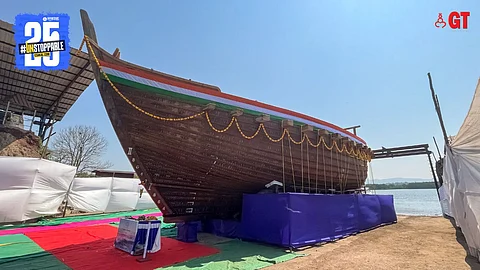

“Would you believe coconut, fish oil, resin and cotton are all it takes to sail the seven seas?” asked Prathamesh Dandekar, as he addressed a gathering on Divar island that stood in awe at the launch of a stitched wooden ship built using ancient methods.
“You’ll probably laugh at me, but these are the very ingredients that went into making of the stitched ship that you see today.”
Dandekar is the managing director of Hodi Innovations Shipyard on Divar Island, where on Wednesday many, including officers of the Indian Navy, had gathered to witness the launch of the wooden ship adorned with the tri-colour and a pattern of IXIX on its hull.
The ship stood ready for its launch on the afternoon of February 26, but the tide didn’t allow it to hit the water.
Chief Guest on the occasion, Rear Admiral KM Ramakrishnan, VSM, Flag Officer Commanding Karnataka Naval Area (FOK) noted that the launch is a "tribute to our ancestors who once ruled these waters and a reaffirmation of the nation’s commitment to honouring and preserving their seafaring legacy."
“Let the ship be the symbol of India’s unbroken connection to the Indian Ocean, an inspiration for future generations and a reminder that the maritime history isn’t just a thing of the past, but the legacy we proudly carry into the future,” the officer said.
Two years ago, on September 12, 2023, India's maritime revival was set in motion when the keel made from Goa’s State tree, Matti, was laid, for constructing a fully functional ancient stitched ship that features a main mast, mizzen mast and a bowsprit mast, all steered through traditional steering oars.
The ship was envisioned to be constructed using an ancient stitching pattern, with its components bound together by coir rope and fibre. Teak and jackfruit wood have been used for constructing the stern and frames, and there is no use of metal anywhere.
Envisioned by Sanjeev Sanyal, a member the economic advisory council to the Prime Minister, who sought to revive the magnificent shipbuilding heritage and has written about the existence of stitched ships in his book The Ocean of Churn, the project has been executed through a tripartite agreement between Hodi Innovations (OPC) Pvt Ltd, the Indian Navy, and the Ministry of Culture.
As a third-generation boat builder from Goa, Dandekar found it a very humbling experience to let go of all the modern gadgets that he loves and pick up tools like a hammer, a chisel, some coir rope and needles, chipping wood and stitching planks together to make this stitched ship.
“It hasn’t been easy, there were countless challenges from the word go. How do you design a ship that was present 2000 years ago? What kind of raw materials were used? How did the construction take place? Finding solutions to all these questions, we’ve got this art in front of us today,” he said.
The boat, caulked with cotton and tree resin, seasoned with fish oil, and powered by cotton sails, is ready to sail anywhere around the world.
Inspired by a 2000-year-old painting that you can find today at the Ajanta Caves, the ship has been designed by Hodi Innovations, and the design tested by Ocean Engineering at IIT Chennai. The construction has been undertaken by traditional artisans from Kerela, led by the highly skilled Babu Shankaran.
Although those present for the afternoon launch didn’t get to witness the boat take to the waters due to the tides, the journey ahead promises to be as historic.
The Indian Navy will take on the next grand endeavour by embarking on an ambitious trans-oceanic voyage, which, after thousands of years, will be undertaken for the first time.
Retired Captain Dilip Donde will lead the training of the crew at Karwar and set a new course in India’s maritime legacy, moving forward with a desire rooted in a deep connection to the past.